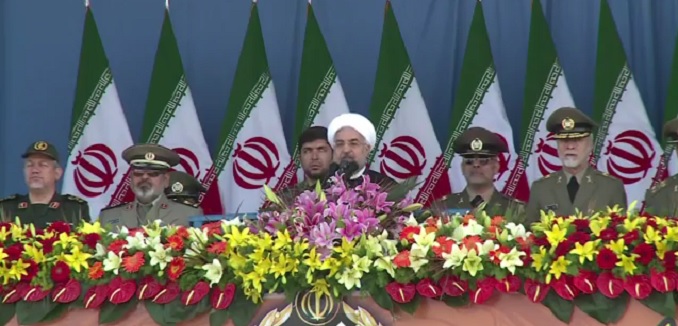Iranian Parliament Speaker Ali Larijani this week urged European leaders to chart an “independent” foreign policy course, the latest in what has become a string of statements from top Iranian leaders suggesting that Washington’s European allies should split from the U.S. in their approach to the Islamic republic:
“The miscalculations of certain countries in the region and across the world have made the situation in some regions more complicated, and the European Union, by adopting an independent and moderate policy, can play a constructive role in the peaceful settlement of the conflicts in different parts of the world,” Larijani said during a meeting with Latvia’s Foreign Minister Edgars Rinkevics in Tehran on Wednesday.
Meanwhile an article published by Foreign Minister Mohammad Javad Zarif in Foreign Affairs‘s May/June edition – titled “What Iran Really Wants: Iranian Foreign Policy in the Rouhani Era” – declared that the “top priority” of the government of Iranian President Hassan Rouhani was “to diffuse and ultimately defeat the international anti-Iranian campaign, spearheaded by Israel and its American benefactors”:
Iran will also engage with European countries and other Western states with the goal of reinvigorating and further expanding relations. This normalization process must be based on the principles of mutual respect and mutual interest, and it must address issues of legitimate concern to both sides. Iran will also expand and consolidate its amicable ties with other major powers, such as China, India, and Russia. As the chair of the Non-Aligned Movement until 2015, Iran will reach out to emerging powers of the “global South” and will try to responsibly mobilize their enormous potential for contributing to global peace and prosperity.
A strategy under which Iran sought to divide U.S. and European negotiators would not be a new one for Rouhani-led diplomatic teams. The revolutionary-era cleric has publicly boasted that, as Iran’s nuclear negotiator during the early 2000s, he sought and succeeded in “widen[ing] the transatlantic gap” between Washington and its allies, providing the Iranian regime with the time it needed to “build up” and then “complete[]” the nuclear technology that it was then pursuing.
[Photo: AFP news agency / YouTube]




